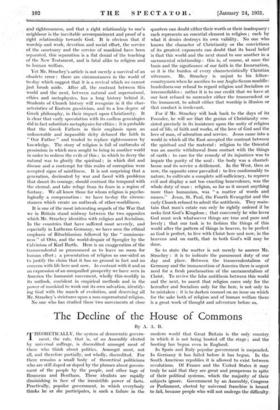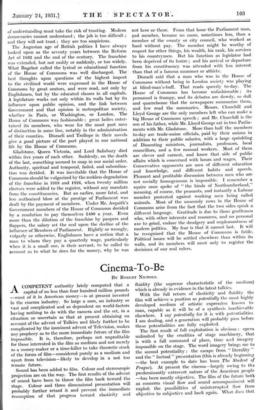The Decline of the House of Commons
By A. A. B.
?THEORETICALLY, the system of democratic govern- - went, the rule, that is, of an Assembly elected by universal suffrage, is discredited amongst most of those who think about politics. Amongst most, not all, and therefore partially, not wholly, discredited. For there remains a small body • of theoretical politicians who are still duped or doped by the phrases about govern- ment of the people by the people, and other tags of Rousseau and Bentham. These idealists are rapidly diminishing in face of the irresistible power of facts. Practically, popular government, in which everybody thinks he or she participates, is such a failure in the modern world that Great Britain is the only country. in which it is not being hooted off the stage ; and the hooting has begun even in England.
In Spain and "Italy popular government is suspended. In Germany it has failed - before it has begun. In the South American republics it is allowed to exist between revolutions. Of France and the United States it may truly be said that they are great and prosperous in spite of their political systems, which the majority of their subjects ignore. Government by an Assembly, Congress or Parliament,- elected by universal franchise is bound to fail, because people who will not undergo-the difficulty, of understanding must take the risk of trusting. Modem democracies cannot understand ; the job is too difficult ; and they will not trust ; they are too suspicious.
The Augustan age of British politics I have always looked upon as the seventy years between the Reform Act of 1832 and the end of the century. The franchise was extended, but not rashly or suddenly, or too widely. What Bagehot called the lyrical or educational function of the House of Commons was well discharged. The • best thoughts upon questions of the highest import to the civilized world were expressed in the House of Commons by great orators, and were read, not only by Englishmen, but by the educated classes in all capitals. A legislature works not only within its walls but by its influence upon public opinion, and the link between Government and that opinion is metropolitan society, whether in Paris, or Washington, or London. The House of Commons was fashionable ; great ladies enter- tained its members, who were for the most part men of distinction in some line, notably in the administration of their counties. Disraeli and Trollope in their novels give a good picture of the part played in our national life by the House of Commons.
Gladstone, Queen Victoria, and Lord Salisbury died within five years of each other. Suddenly, on the death of the last, something seemed to snap in our social order. Authority, spiritual and temporal, faded, and subordina- tion was derided. It was inevitable that the House of Commons should be vulgarized by the reckless degradation of the franchise in 1918 and 1928, when twenty million electors were added to the register, without any mandate from the constituencies. But an earlier, more fatal, and less authorized blow at the prestige of Parliament was dealt by the payment of members. Under Mr. Asquith's Government members of the House of Commons decided by a resolution to pay themselves 1400 a year. Even more than the dilution of the franchise by paupers and flappers, the salary set the seal upon the decline of the influence of Members of Parliament. Rightly or wrongly, vulgarly or otherwise, Englishmen have a notion that a man to whom they pay a quarterly wage, particularly when it is a small one, is their servant, to be called to account as to what he does for the money, why he was not here or there. From that hour the Parliament man, qua member, became no more, sometimes less, than a member of the county or city council, who worked as hard without pay. The member might be worthy of respect for other things, his wealth, his rank, his services to his countrymen. But his function as legislator had been deprived of its lustre ; and his arrival or departure from his constituency was attended with less interest than that of a famous mummer or athlete.
Disraeli said that a man who was in the House of Commons without being in London society was playing at blind-man's-buff. That reads queerly to-day. The House of Commons has become unfashionable ; its personnel is frumpy, and its debates are dowdy, so dull and quarrelsome that the newspapers summarize them, and few read the summaries. Messrs. Churchill and Lloyd George are the only members left who can make a big House of Commons speech ; and Mr. Churchill is the son of his father, while Mr. Lloyd George sat in two Parlia- ments with Mr. Gladstone. More than half the members to-day are trade-union officials, paid by their unions in addition to their public salaries, with a large sprinkling of Dissenting ministers, journalists, professors, local councillors, and a few manual workers. Most of them are clever and earnest, and know that side of public affairs which is concerned with hours and wages. Their Conservative opponents are men of different education and knowledge, and different habits and speech. Pleasant and profitable discussion between men who are not socially homogeneous is impossible. I remember a squire once spoke of " the hinds of Northumberland," meaning, of course, the peasants, and instantly a Labour member protested against working men being called animals. Most of the unseemly rows in the House of Commons arise from the fact that the two sides speak a different language. Gratitude is due to those gentlemen who, with other interests and resources, and no personal axe to grind, endure the drudgery and unpleasantness of modem -politics. My fear is that it cannot last. It will be recognized that the House of Commons is futile. Political issues will be settled elsewhere than within its walls, and its members will meet only to register the decisions of our real rulers.







































 Previous page
Previous page